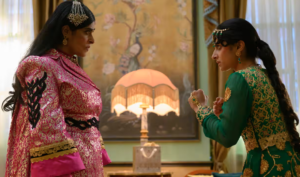Brown aunties of the world
We’ve all encountered the term “brown aunty” at some point, but for those who are unfamiliar, it’s a colloquialism referring to older, often South Asian women notorious for their tendency to comment on and control the actions of those around them, particularly younger women.
As someone who’s been on the receiving end of the “brown aunty” treatment, I can vouch for how deeply frustrating and dehumanising it can be. It’s not just the audacity with which these women feel entitled to comment on our lives; it’s their approach – marked by a sense of superiority and a striking lack of empathy or understanding.
It’s not just the “brown aunties” themselves; it’s the culture they thrive in. In many South Asian cultures, respect for elders is the name of the game, and there’s this notion that older generations hold a monopoly on wisdom. Now, don’t get me wrong; respect is cool, but sometimes it feels like we’re handing over the remote control of our lives. Let’s hit pause on that and find a balance, shall we?
In our diverse world, each of us carries a unique tapestry of experiences and beliefs, shaped by the paths we’ve walked and the lessons we’ve learned. These beliefs are not inherently good or bad; they’re simply different. It’s crucial to respect this diversity and recognise that what one person values or believes may not align with another’s perspective. Our individual journeys are what make us who we are, and they deserve acknowledgment and respect. In this context, the ‘brown aunties’ of the world, and anyone else for that matter, should embrace the beauty of these differences and refrain from imposing their own beliefs onto others. Let us coexist in a spirit of understanding and mutual respect.
This behavior is something most of us young women encounter, especially during occasions like weddings and gatherings. It’s the relentless questioning about when we’ll tie the knot or, if we’re already married, when we’ll be having children. The underlying assumption that a woman’s worth is primarily tied to her marital status and ability to bear children is deeply personal and often fraught with complexities. What if someone can’t conceive? What if they choose not to have children or cannot afford childcare? It’s certainly not within the purview of nosy acquaintances to decide. I’m not a container of yogurt tucked away in the fridge with an expiration date, anxiously waiting to be consumed (read: married) before it goes “bad.” Marriage isn’t a race against the clock!
Furthermore, it’s essential to recognise that such intrusive behavior isn’t confined to any particular culture or gender. It can be found across various backgrounds and among both men and women. Respecting boundaries and understanding that we are all adults capable of making our own choices and decisions is paramount.
Our lives are ours to live, and our worth is not determined by outdated stereotypes or the expectations of others.


Hahahaha 😆this is harilious and my fv blog finally you work on them